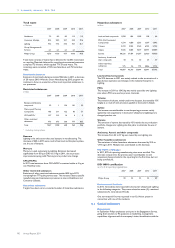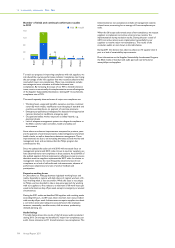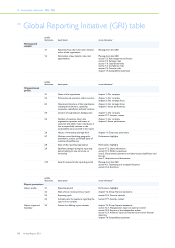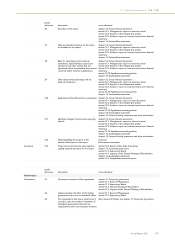Philips 2011 Annual Report Download - page 192
Download and view the complete annual report
Please find page 192 of the 2011 Philips annual report below. You can navigate through the pages in the report by either clicking on the pages listed below, or by using the keyword search tool below to find specific information within the annual report.
14 Sustainability statements 14.4 - 14.5
192 Annual Report 2011
number of enrollments
2007 2008 2009 2010 2011
Core Curriculum
programs 12,000 10,000 5,500 20,000 39,600
Our Core Curriculum offers learning opportunities in the areas of
personal effectiveness, people management and business acumen. With
over 39,000 enrollments in programs in the Core Curriculum during
2011, enrollment increased significantly compared with 20,000 the
previous year.
Our Functional Core Curriculum includes courses in Marketing, Sales,
Customer Services, IT, HRM, Supply Management and Finance.
Enrollment in the Functional Core Curriculum was over 25,000 in 2011,
compared with around 15,500 in 2010. Many Functional Curricula are
tied to mandatory learning plans designed to increase our
organizational capability.
We had over 30,000 employees participate in various ethics and
compliance related trainings.
Talent pipeline curriculum
The Talent Pipeline Curriculum consists of specially designed learning
interventions across the talent pool. These programs are created and
deployed in collaboration with the top global universities. They provide
accelerated learning opportunities to our talent and offer action
learning projects to apply learnings to a business opportunity that in
turn creates value for Philips.
Octagon is a development program for top potentials and Inspire is for
high potentials. We continued our investment in and focus on talent
development by facilitating the completion of 18 Inspire project
assignments. Top potentials in the Octagon program completed eight
business projects. These business projects are sponsored by senior
business leaders and enable the realization of Philips’ strategic goals.
Executive education
To help our executives to continue to develop their careers and
strengthen their leadership skills, we have been offering a curriculum
of internal and external programs. Participation in these programs was
comparable to 2010.
Training spend
Our training spend in 2011 amounted to EUR 58 million, about 10%
less than in 2010.
Health and Safety
Philips strives for an injury-free and illness-free work environment, with
a sharp focus on decreasing the number of injuries. This is defined as a
KPI, on which we set yearly targets for the company and our individual
sectors.
We regret to report two fatalities in 2011, of which one was related
to a safety accident and one to a traffic accident whilst commuting.
In 2011, we recorded 405 Lost Workday Injuries cases, i.e. occupational
injury cases where the injured person is unable to work the day after
the injury. This is a 16% decrease compared with 2010. The number of
Lost Workdays caused by these injuries amounted to 11,602 days. The
rate of Lost Workday Injuries decreased to 0.38 per 100 FTEs,
compared with 0.50 in 2010.
Lost Workday Injuries
per 100 FTEs
2007 2008 2009 2010 2011
Healthcare 0.29 0.27 0.20 0.25 0.20
Consumer Lifestyle 0.61 0.44 0.26 0.26 0.23
Lighting 1.35 1.17 0.76 0.80 0.64
Group Management &
Services 0.12 0.12 0.07 0.13 0.04
Philips Group 0.81 0.68 0.44 0.50 0.38
All sectors showed a decrease in Lost Workday Injury cases, but the
reduction was most visible in Lighting. In Lighting a dedicated action
program, Safety First was launched four years ago to drive down injury
levels. We started a number of health and safety initiatives in the other
sectors as well.
Social Investment Programs
As part of our drive to improve the health and well-being of people
around the world, our focus on engaging the next generation on healthy
lifestyle continued in 2011 with the further expansion of our
SimplyHealthy@Schools program. We expanded the program from 38
countries in 2010 to 55 countries and over 400 schools and reaching
over 120,000 students via our school visits and road shows. Over 4,500
employees around the world actively engaged in the program.
We also continued our support of the American Heart Association’s
Start! Heart Walk multi-city events. In 2011, we also launched a new
employee volunteer program in North America called “Philips Cares:
giving back to our communities”. Over 3,500 Philips employees from
North America volunteered for these programs.
14.5 General Business Principles
In 2011, 269 reports were submitted relating to alleged violations of
the General Business Principles (GBP), compared with 338 reports in
2010, 318 in 2009 and 360 in 2008.
We see a considerable decline in number of complaints reported. This
can be contributed mainly to a decline in number of complaints in the
Americas. However, North America still accounted for the largest
number of reports (32% compared with 36% in 2010), closely followed
by Latin America that accounted for 32% of all complaints reported
(compared with 36% in 2010). This dominance remains probably due
to a corporate culture in which employees are very much aware of
compliance issues, their rights and the opportunities for reporting
potential violations. With 19% of the total number of reported
complaints, Europe and the Middle East region show a small relative
increase in comparison with 2010 (17%). The strongest increase took
place in the Asia Pacific region that accounted for 17% of all reports
(2010: 11%).
Most common types of alleged violations
Treatment of employees
While they have decreased considerably, most alleged violations still
fall under the Treatment of employees category, which represented
49% of all violations (2010: 54%). As in 2010, the vast majority of these
complaints (almost 85%) related to two issues – Discrimination and
Respectful treatment.
Complaints regarding Discrimination mainly relate to discrimination
based on gender and favoritism, and originated principally in the US and
Brazil. Of the complaints reported in the US, 23% related to
discrimination. Of the complaints reported in Brazil, 23% related to
discrimination, whereas that figure was just over 15% for Philips as a
whole.
Most complaints regarding lack of Respectful treatment – primarily
verbal abuse and harassment – again came from the US and Brazil, as
well as Mexico. Of the complaints reported in the US, 35% related to
respectful treatment. Of the complaints reported in Brazil, 34% related
to respectful treatment. Of the complaints reported in Mexico, 35%
related to respectful treatment, compared with 26% for Philips as a
whole. There is no clear indication of the reason for this sudden decline.
In any case, the number of complaints is reason to remain vigilant and
devote enhanced attention in management and worker training to this
topic. One of the initiatives taken in this regard is the planned launch
of a ‘Mutual Respect’ e-training in Brazil early in 2012. Further, these
topics are part of the GBP e-training for management, that was launched
late in 2011 to higher management and executive level.
Business integrity
In second place, with 40% of the total number of complaints, are
allegations in the Business Integrity category (2010: 33%). While the
percentage has gone up, we see a slight decrease in the actual number of
complaints. The increase in percentage was mainly due to the effect of a
considerable decrease in the number of allegations in the Treatment of
employees category.
























